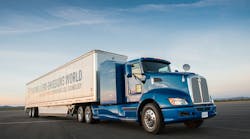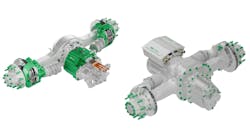Toyota Motor North America (TMNA) officially took the wraps off its “Project Portal” prototype Class 8 tractor this week – a hydrogen fuel cell system designed for heavy duty trucks operating at the Port of Los Angeles.
The OEM said this “proof of concept” zero-emission truck is fully functioning, with the power and torque capacity to conduct port drayage operations while emitting nothing but water vapor. It will be part of a feasibility study that begins this summer which will examine the potential of fuel cell technology in heavy duty applications
“By bringing this heavy duty, zero emission hydrogen fuel cell proof of concept truck to the Port, Toyota has planted a flag that we hope many others will follow,” said Mary Nichols, chair of the California Air Resources Board (CARB), in a statement.
“CARB will be following the progress of this feasibility study with interest, as we look to develop the best mix of regulations and incentives to rapidly expand the market for the cleanest, most efficient big trucks to meet the need for dramatic change in the freight sector,” she added.
“Hydrogen fuel cell vehicles play a role in California’s efforts to achieve greenhouse gas emission reduction goals, improve air quality, and reduce our reliance on fossil fuels,” added Janea Scott with the California Energy Commission (CEC), which is why the CEC making invests in the refueling infrastructure needed to support adoption of these vehicles, Scott noted.
The Project Portal tractor generates more than 670 hp and 1,325 lb.-ft. of torque from two Mirai fuel cell stacks and a 12 kilowatt-per-hour (kWh) battery – a relatively small battery to support Class 8-type loads, Toyota noted.
The concept’s gross combined weight capacity is 80,000 lbs., and its estimated driving range is more than 200 miles per fill, under normal drayage operation, noted Bob Carter, executive vice president with TMNA.
“Toyota believes that hydrogen fuel cell technology has tremendous potential to become the powertrain of the future,” he said. “With Project Portal, we’re proud to help explore the societal benefits of a true zero emission heavy-duty truck platform.”



